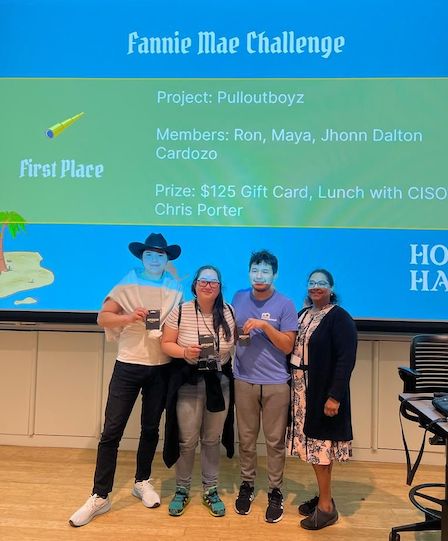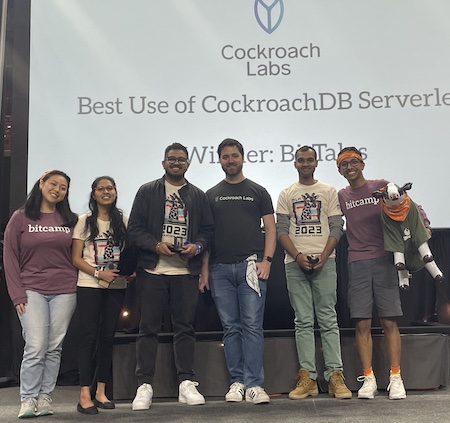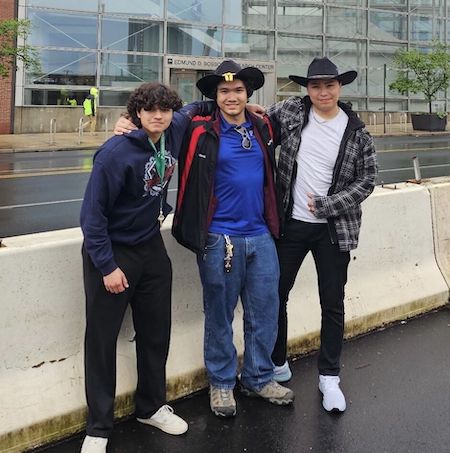The Mason Nation’s strength was undeniable at several hackathons in spring 2023. George Mason University computer science, cybersecurity engineering, information technology, and mechanical engineering students won challenges on March 25 at the University of Virginia (UVA), on April 7-9 at the University of Maryland (UMD), and on April 29-30 at Drexel University.
What’s a hackathon?
Hackathons take place over a limited span of time, usually 24 hours. Teams comprising several students choose which “tracks” they want to compete in, with each track delineating a different challenge. Hackathons are generally free for participants, with travel, accommodation, and food provided, making them a relatively equitable opportunity for students.
At the outset of a hackathon, sponsoring or organizing bodies present on the different tracks and offer workshops on relevant tools for the challenges at hand. The events are thus valuable networking opportunities where participants meet not only industry professionals, but also like-minded entrepreneurial peers.
Over the course of the event, teams build a minimum viable product, submit their project through GitHub, and create a DevPost page to display their project before presenting to a panel of judges during an exhibition period. At the end of the event, prizes are awarded for many of the tracks.
HooHacks 2023 at the University of Virginia

HooHacks, put on by a student group at the University of Virginia of the same name, comprises six levels of challenges and includes a special element sponsored by Fannie Mae. The event took place over 24 hours, starting at noon on March 25.
Two Mason teams, one comprising upperclassmen and one comprising freshmen, brought home wins including at least $500, respectively.
Seniors Jhonn Cardozo and Ronald Santos Garcia and junior Maya Crosby took home $500 and the pride of winning the primary challenge in one of the 50 biggest hackathons in the country. After being announced as winners, the team was approached by Fannie Mae staffers, who told them they were extremely impressed with their performance.
Snagging Best Overall prize at HooHacks was a team of Mason freshmen. Anthony Perry, Daniel Horvath, and Marco Zamora brought home more than $500 in prizes and an invitation to compete at Pinnacle, perhaps the most competitive collegiate hackathon worldwide. The team had been encouraged to participate in the event by their fellow Mason participants. Although only freshmen, the teammates had an existing relationship, as they had all been on a robotics team in high school.
The team’s project, Dangerous Audio Detection (DAD), is an Alarm System Network that uses machine learning algorithms to accurately identify the sound of gunshots and alerts community members.
“The idea for our project, DAD, stemmed from our desire to answer [Mason President] Gregory Washington’s call to solve the grand challenges in our world,” the team said.
“We are especially excited about participating in Pinnacle, often referred to as the Olympics of collegiate-level hackathons, as we have received a prestigious invitation. This experience has solidified our commitment to continuous learning and participation in hackathons as a means to push our boundaries and contribute to our community’s grand challenges,” the team said.
Bitcamp at the University of Maryland

An undergraduate and a graduate team garnered acclaim at the University of Maryland’s Bitcamp hackathon, the largest collegiate hackathon on the east coast. The event had five primary tracks, varying from machine learning to quantum computing, and included more than 1,000 students, packed into the Xfinity Center on the College Park campus.
The upperclassmen team from HooHacks—with the addition of Mason alum Katherine Horvath, a information technology graduate and freshman Daniel’s sister—was one of two teams to win awards in two different challenges, including taking first in the Bloomberg Industry Group challenge. The Bloomberg project involved using any public/government data to showcase a specific application highlighting data insights and intelligence. The team’s solution elicited praise from Bloomberg representatives, with the sponsors noting how impressed they were with the product.
A team of international graduate students studying computer science also won two tracks with their project BitTales, a natural language processing-based web application that turns meaningful conversations into personalized bedtime stories. Master’s students Janit Bidhan and Aabha Bothera and doctoral candidate Saurabh Srivastava won both the Best Use of CockroachDB Serverless and the Best Machine Learning Hack awards at the event, bringing home more than $400 in prize money.
DragonHacks 2023 at Drexel University.

Two members of the victorious HooHacks 2023 freshmen team, Daniel Horvath and Anthony Perry, joined a member of the successful upperclassmen team from the same event, Jhonn Dalton Cardozo, to participate in DragonHacks 2023 at Drexel University. The hybrid team won Best Environmental Hack for their project Perfect Application for Plant Assistance (PAPA). The project “aimed to help solve food insecurities through encouraging sustainable botany practices,” said Horvath and Perry. Mason’s Patriot Pantry inspired the team to use competition as a means of incentivizing efforts to end food insecurity, the team wrote in the project description.
“Our decision to pursue the best environmental hack track at Dragon Hacks stemmed from a desire to explore new territories, engage in a hardware–software integration project, and the enticing prospect of winning some TVs,” Cardozo recalled. “But beyond the prizes, our team was fueled by a genuine commitment to make a difference and create a solution that would contribute to the well-being of the environment.”
Reflections on Three Hackathons
Jhonn Dalton Cardozo gleaned lessons from his experience in each of these hackathons.
“During the UVA hackathon, I discovered that teamwork is the backbone of any successful project,” he noted.
“At Bitcamp, I realized that commitment and dedication to a project can take you far,” he added.
“At Dragon Hacks, the importance of team management became even more apparent,” he said. “Having a talented team is fantastic, but knowing how to leverage their strengths and expertise is the real key to success. Recognizing the value of different perspectives, interests, and potential within each team member was a crucial aspect of creating our final project. While this might sound like common knowledge, I never fully appreciated the challenge and gratification of managing a team while doing the actual work. I am truly grateful for the exceptional group of individuals in my team and deeply appreciate their efforts in bringing our collective vision to life.”
